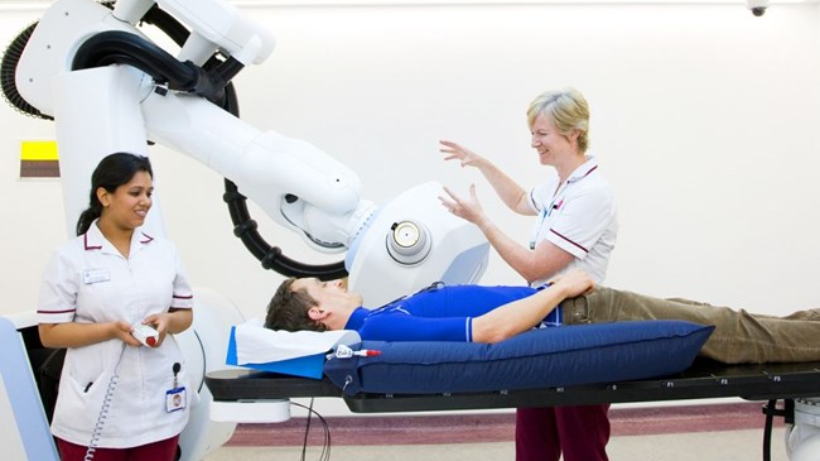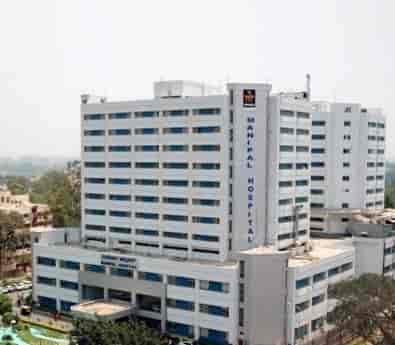Manipal Hospital, Bangalore
Central Mall, 45/1, 45th Cross Rd, opp. Bangalore, Kottapalya, Jayanagara 9th Block, Jayanagar, Bengaluru, Karnataka 560069, India
The seeds of our origin were sown as early as 1953 when the founder of the Manipal Education and Medical Group (MEMG), Dr. T.M.A. Pai, established the Kasturba Medical College in Manipal, Karnataka. Manipal Hospitals... read more
Send EnquiryAbout The Hospital
- The seeds of our origin were sown as early as 1953 when the founder of the Manipal Education and Medical Group (MEMG), Dr. T.M.A. Pai, established the Kasturba Medical College in Manipal, Karnataka. Manipal Hospitals as an entity came into existence in 1991 with the launch of our 650-bed flagship hospital at Old Airport Road, Bangalore.
- Their core values are built around the thought of patient-first and that each doctor at Manipal Hospitals is a human care expert, going above and beyond the call of duty as they live by the belief that every single life is priceless. When they embark on these journeys, stories emerge - stories of grit, determination and never giving up.
Overview
- Manipal Hospitals is one of India's foremost multi-specialty healthcare providers catering to both Indian and international patients. They are a part of the Manipal Education and Medical Group (MEMG), a leader in the areas of education and healthcare. With more than 5000 operational beds, they are commitment to the overall well-being of an individual is at the core of everything they do. Through their network of hospitals and experienced team of medical professionals, they provide quality and affordable healthcare to everyone.
Our Core Values
- At Manipal Hospitals, they are devoted towards clinical excellence, patient-centricity, and ethical practices. Their commitment to clinical excellence is palpable in the high calibre of the team of medical practitioners. The nursing staff and paramedical professionals are highly competent and provide great support to clinical team.
- Healthcare services are aligned towards the patients’ needs. Creating a compassionate and supportive environment for patients and their caregivers is of utmost importance. Patient-first approach has earned goodwill of patients not just from within India, but also from across the world including the Middle East, Africa, and South-East Asia. They attach the highest importance to ethical practices which is evident in professional conduct, honesty, trust, and confidentiality.
Treatments Offered
Top Doctors
Lead Consultant - Hpb And Liver Transplantation Surgery
CONSULTS AT EXPEREIENCE :30 years SURGERIES :
NA
Treatment Starting at $5,100
Free Text ConsultTreatment Starting at $5,100
30 years SURGERIES :
NA TREATMENT COST
Starting at $5,100
Sr. Consultant, Vascular And Endovascular Surgery
CONSULTS AT EXPEREIENCE :25 years SURGERIES :
NA
Treatment Price on request
Free Text ConsultTreatment Price on request
25 years SURGERIES :
NA TREATMENT COST
Treatment Price on request
Sr. Consultant – Vascular And Endovascular Surgery
CONSULTS AT EXPEREIENCE :27 years SURGERIES :
NA
Treatment Price on request
Free Text ConsultTreatment Price on request
27 years SURGERIES :
NA TREATMENT COST
Treatment Price on request
Treatment Price on request
Free Text ConsultTreatment Price on request
39 years SURGERIES :
NA TREATMENT COST
Treatment Price on request
Treatment Price on request
Free Text ConsultTreatment Price on request
43 years SURGERIES :
NA TREATMENT COST
Treatment Price on request
Hod & Consultant Cardiovascular & Thoracic Surgeon
CONSULTS AT EXPEREIENCE :31 years SURGERIES :
10000+
Treatment Price on request
Free Text ConsultTreatment Price on request
31 years SURGERIES :
10000+ TREATMENT COST
Treatment Price on request
Patient Testimonials
Nearby Guest House
Team & specialisation
Centres of Excellence
- Accident and Emergency Care
- Cancer Care/Oncology
- Cardiology
- Cardiothoracic Vascular Surgery
- Gastrointestinal Science
- Laparoscopic Surgery
- Liver Transplantation Surgery
- Nephrology
- Neurology
- Neurosurgery
- Obstetrics and Gynecology
- Organ Transplant
- Orthopaedics
- Paediatric And Child Care
- Rheumatology
- Spine Care
- Urology
Infrastructure

Number Of Beds
240

Operation Theatres
NA

No Of Surgeon
38
Blogs

Top Pulmonologists for Prominent Bronchovascular Markings Treatment
In a world where information flows freely and choices abound, making the right healthcare decisions can be overwhelming. When it comes to matters as critical as your health or the well-being of your loved ones, finding the right specialist can make all the difference. One such vital area of expertise is pulmonology, where experienced professionals can provide crucial insights and treatments for respiratory conditions, including the assessment and management of prominent bronchovascular markings.Dr. Sushmita RoychowdhuryConsultant - PulmonologistConsults at : Fortis Hospital Anandapur KolkataApollo Gleneagles Hospitals, KolkataDr. Sushmita Roy Chowdhury is a Pulmonologist at Apollo Gleneagles Hospital and Fortis Hospital in Kolkata.She has 26 years of experience in her field.Her area of specialization includes Bronchoscopy, ICD Drain, Pigtail Catheterization, Pleural Biopsy, USG Thorax, Central Venous line, Intubation, and EBUS, TBNA, Pulmonary Hypertension, Interventional Pulmonology, and critical care.She obtained her MBBS degree from the West Bengal University of Health Sciences in 1997, MD - Tuberculosis & Respiratory Diseases/Medicine – Lucknow University of Health Science in 2001.She has been honored with Prominent Positions in several Organizations for her notable services and achievements.She is a member of Indian Chest Society, an association of Physicians in India.She was awarded European Diploma in Adult Respiratory Medicine (HERMES Diploma) in 2011 at Amsterdam.She became a fellow of Royal College of Physician (Edinburgh) FRCP in July 2022.Some of the services she provides are extracorporeal Membrane Oxygenation, Pulmonary Function Test, Chronic pain treatment, Asthma, COPD, ILD, Interstitial Lung Disease, Respiratory failure, and Interventional Pulmonology, etc.She looks after the work of Pulmonary Medicine in this Department.She has worked in many reputed hospitals in India.Area of Interest Bronchial Asthma Treatment, Chest Disease Treatment, Pleurisy Treatment, Thoracoscopy, Pneumonia Treatment, Lung Infection, Lung Abscess, Lung Cancer Treatment, Tuberculosis Treatment, Cough Treatment, Eosinophilia Treatment, Bronchoscopy, Thoracentesis, ICD Drain, Pigtail Catheterization, Pleural Biopsy, USG Thorax, Central Venous line, Intubation, EBUS, TBNA, Pulmonary Hypertension, and Interventional Pulmonology.Dr Sivaresmi Unnithan RoyConsultant- PulmonologyConsults at : Apollo Gleneagles Hospitals, KolkataDr. Sivaresmi Unnithan is a Pulmonologist at Apollo Gleneagles Hospital, Kolkata. She has 19 years of experience in her field. Her area of specialization includes Bronchoscopy, Thoracocentesis, ICD Drain, Pigtail Catheterization, Pleural Biopsy, USG Thorax, Central Venous line, Intubation, and EBUS, TBNA, Pulmonary Hypertension, Interventional Pulmonology and critical care. She has published 3 papers in national journals and 3 papers in international journals. She has participated in the landmark ILD Registry in India, and is now a member of the India SWORD survey. She looks after the work of Pulmonary Medicine in this Department. She obtained her MBBS degree from the West Bengal University of Health Sciences in 2003, MD - Tuberculosis & Respiratory Diseases/Medicine - Rajasthan University of Health Science, Jaipur, 2011. For her notable services and achievements, she has been honoured with Prominent Positions in several Organizations. Apart from this, she is also a member of Indian Chest Society, An association of Physicians in India. She has also done extensive research work and her publications are part of several National Journals. She has worked in many reputed hospitals in India. Some of the services she provides are extracorporeal Membrane Oxygenation, Pulmonary Function Test, Body Plethysmography and bronchitis treatment.Treatment:Bronchial Asthma TreatmentChest Disease TreatmentPleurisy treatmentThoracoscopyPneumonia TreatmentLung InfectionLung AbscessLung Cancer TreatmentTuberculosis TreatmentCough TreatmentEosinophilia TreatmentBronchoscopyThoracocentesisICD DrainPigtail CatheterizationPleural BiopsyUSG ThoraxCentral Venous lineIntubationEBUSTBNAPulmonary HypertensionInterventional PulmonologyDr. Davinder KundraConsultant - PulmonologyConsults at : Manipal Hospital, New DelhiDr. Davinder Kundra is a Pulmonary Medicine consultant at Manipal Hospital in Dwarka, Delhi, India. He is a highly qualified and experienced physician who specialises in the diagnosis and treatment of respiratory diseases, including asthma, COPD, lung cancer, and tuberculosis.Dr. Kundra completed his MBBS degree from Government Medical College, Amritsar, and went on to pursue his MD in Pulmonary Medicine from the prestigious Postgraduate Institute of Medical Education and Research (PGIMER), Chandigarh. He has also completed a Fellowship in Interventional Pulmonology from the National University Hospital, Singapore.With over 15 years of experience in his field, Dr. Kundra is known for his expertise in bronchoscopy, thoracoscopy, and other interventional procedures. He has published numerous research papers and articles in national and international journals and has also presented his work at various conferences and seminars.Dr. Kundra is committed to providing personalized and compassionate care to his patients and works closely with them to develop treatment plans that are tailored to their individual needs. He is highly regarded by his colleagues and patients alike for his clinical skills and dedication to his profession.Expertise:Lung FibrosisAsthma and AllergyRespiratory Disorders like- COPDTuberculosisPneumoniaSarcoidosisSleep medicine and sleep studiesInterventional Pulmonology- Fiberoptic Bronchoscopy, Lung BiopsyDr. Nevin KishoreHead Of Bronchology & Senior Consultant - Respiratory MedicineConsults at : Max Healthcare Saket Dr. Nevin Kishore practises medicine and has 26 years of expertise. In Gurgaon's Sushant Lok I, Max Hospital is where Dr. Nevin Kishore works. In 1996, he received his MBBS degree from the All India Institute of Medical Sciences in New Delhi.He belongs to the World Association of Bronchology and Interventional Pulmonology, the European Association of Bronchology and Interventional Pulmonology, the European Respiratory Society, the Royal College of Physicians in the United Kingdom, the American College of Chest Physicians, and the Delhi Medical Council (WABIP). The doctor offers a variety of procedures, including paediatric chest care, bullectomies, mediastinoscopy, TB treatment, and pleurisy, among others.Specialties:Bronchology, Respiratory Medicine, Interventional BronchoscopyHow can we help with the treatment?If you're on the lookout for treatment in India, Thailand, Singapore, Malaysia, UAE, and Turkey, let Healthtrip be your compass. We will serve as your guide throughout your medical treatment. We'll be by your side, in person, even before your medical journey commences. The following will be provided to you: Global Network: Connect with 35+ countries' top doctors. Partnered with 335+ leading hospitals.Comprehensive Care: Treatments from Neuro to Wellness. Post-treatment assistance and TeleconsultationsPatient Trust: Trusted by 44,000+ patients for all support.Tailored packages: Access top treatments like Angiograms.Real Experiences: Gain insights from genuine patient testimonials.24/7 Support: Continuous assistance and emergency help.Our success story

Top CyberKnife Specialists and Centers
IntroductionCyberKnife is a type of radiation therapy that uses a robotic arm to deliver highly focused beams of radiation to tumors. It is a non-invasive treatment that does not require surgery.CyberKnife is often used to treat tumors in the brain, spine, and other areas of the body that are difficult to reach or operate on. It can also be used to treat tumors that are close to critical structures, such as nerves and blood vessels.CyberKnife treatment is typically done in a series of outpatient treatments. During each treatment, the patient lies on a table and the CyberKnife robotic arm moves around their body to deliver the radiation beams. The patient does not feel any pain during the treatment.1. Dr. Pushpender Kumar SachdevaDirector & Head Of NeurosurgeryConsults at: Venkateshwar HospitalDr. P. K. Sachdeva, is a well-known Neurosurgeon in Delhi. A medical graduate from Maulana Azad Medical College, Dr Sachdeva holds an MS from Lady Hardinge Medical College and MCH Neurosurgery from GB Pant Hospital, New Delhi.Dr. Sachdeva brings with him a vast experience of nearly two decades in the field of neurosurgery, neuro spine surgery, neuro-oncology and radio-surgery.Besides the body of his surgical work, he is an avid speaker at national and international conferences.He has participated in a number of trials in the treatment of high grade brain tumors. He has held the position of a Visiting Consultant at Royal Preston Hospital, UK and has trained in Gamma Knife Radio-Surgery at the prestigious New York Medical School, USA.He has undergone training for cyber knife from very reputed centre (Miami Cyberknife Centre) at Miami, USA.2. Dr. Rajendra PrasadSr. Consultant - Neurosurgery And Spine SurgeryConsults at: Indraprastha Apollo HospitalSenior Consultant, Department of Neurosurgery & Spine Surgery, Indraprastha Apollo Hospital, New DelhiDistinguished Clinical Tutor, Apollo Hospitals Educational & Research Foundation, (AHERF).Honorary Medical Director, Indian Head Injury Foundation (IHIF), New Delhi.Founder Trustee of KARA Medical Foundation.CLINICAL CAREER / TRAINING:Indraprastha Apollo Hospitals, New Delhi : Senior Consultant Neuro and spine surgeon on going since July 1996.Spine Surgery Fellowship : Royal National Orthopedic Hospital, Stanmore, London. 1995-96Senior Registrar/ Registrar in Neurosurgery: Frenchay Hospital, Bristol. U.K. 1991-92.Registrar in Neurosurgery: Nottingham University Hospital, Queens Medical Centre, Nottingham. 1984-87.Registrar in Neurosurgery: National Hospital for Nervous Diseases, London, 1983.Senior House Officer in Neurosurgery: Cork Regional Hospital, Cork, Ireland 1979-80General Surgery/ Emergency pre-fellowship training jobs at Senior House Officer level at Harrogate, Huddersfiels and Mallow.EDUCATIONAL WORKDistinguished Tutor for AHERF and PG thesis guide for students of the Diploma of the National Board in Neurosurgery.MRCS Examiner for Royal College of Surgeons EdinburghJournal reviewer for the British Journal Of Neurosurgery, Indian Spine Journal and Open Journal of Modern NeurosurgeryLarge number of presentations at National and International meetings.MEDICAL TECHNOLOGY INTERESTFirst in Asia to use da Vinci Robot for robotic spine surgery in 2013 For which was awarded the British Medical Journal Award in 2014 for the ‘ Surgical Team of the year”.Amongst first users in India of artificial disc for Cervical and Lumbar disc Replacement (Bryan Disc) and Interspinous Dynamic stabilization devices before its approval for use in the USA by FDA.Amongst first users of Robotic Navigation in brain surgery (ISG) in 1991-92 while working at Frenchay Hospital, Bristol. U.K..Part of development of clinical protocols for brain tumour imaging during development of first MRI in 1985-86 while working at Nottingham University Hospital. U.K .Collaborating with the Indian Institute of Technology (I.I.T) Delhi for development of Tele-metric wireless brain monitoring system.Special InterestMinimal invasive spine surgery (MISS) including microdiscectomy for cervical and lumbar disc disease and artificial disc replacement, and cervical and lumbar canal stenosis.Spinal instrumentation for spinal injuries, tumor, Tb and degenerative spine.Back pain treatment including Radio frequency rhizotomy for facet joint and sacro-illiac pain.Microsurgery and stereotactic surgery for brain and spine tumors.Neuro-rehabilitation for head and spine injuries.Assistive Technology (AT) in neuro-rehabilitation.3. Dr. Aditya GuptaChief - Neurosurgery & Cns Radiosurgery & Co-chief - Cyberknife CentreConsults at : Artemis HospitalDr Aditya Gupta, is an accomplished Neurosurgeon, has not only developed excellent surgical techniques for a wide variety of brain tumors, with an emphasis on microsurgery and radiosurgery, but also has special and unique skills in managing patients ofa) Movement Disorders with Deep Brain Stimulation (DBS),b) Surgery for Epilepsyc) Nerve and Brachial Plexus Surgeryd) Brain aneurysmse) AVMs.Dr Aditya Gupta is also an expert in all kinds of spine surgery. He is clearly one of the best neurosurgeons in the country today.AwardsSir Dorabji Tata Award, 1996Best Research Paper Award, IES, 1999BOYSCAST Fellow, President of India, 2006Chief of Army Staff Award, 2012Top HospitalsArtemis Hospital Sector 51, Gurugram, Haryana 122001, IndiaArtemis Cyberknife Cancer Treatment & Radiation Therapy Center is a state-of-the-art facility located in Gurugram, Haryana, India. It is one of the leading cancer treatment centers in the country and is equipped with the latest technology and expertise to provide comprehensive care to cancer patients.The center offers a wide range of cancer treatments, including CyberKnife radiosurgery, radiation therapy, and chemotherapy. CyberKnife is a non-invasive radiation therapy treatment that uses a robotic arm to deliver precise beams of radiation to tumors anywhere in the body. It is a highly effective treatment for a variety of cancers, including brain tumors, lung cancer, liver cancer, and kidney cancer.The center's team of experienced and qualified oncologists, radiation therapists, and other healthcare professionals work together to develop personalized treatment plans for each patient. They are committed to providing high-quality, compassionate care to all of their patients.Here are some of the key features of Artemis Cyberknife Cancer Treatment & Radiation Therapy Center:It is equipped with the latest CyberKnife technology, which is one of the most advanced radiation therapy systems available in the world.The center has a team of experienced and qualified oncologists, radiation therapists, and other healthcare professionals who are dedicated to providing high-quality, compassionate care to their patients.The center offers a wide range of cancer treatments, including CyberKnife radiosurgery, radiation therapy, and chemotherapy.The center provides personalized treatment plans for each patient, based on their individual needs and condition.The center has a modern and comfortable infrastructure that provides patients with a positive and healing environment.Artemis Cyberknife Cancer Treatment & Radiation Therapy Center is a leading cancer treatment center in India that provides comprehensive care to patients with a variety of cancers. It is equipped with the latest technology and expertise to offer patients the best possible chance of recovery.2 Indraprastha Apollo Hospital Indraprastha Apollo Hospitals, Sarita Vihar, Delhi-Mathura Road, New Delhi - 110076. India Ph:011-26925858 011-29871090/1091ew Delhi, IndiaA breakthrough technology in treatment of cancer, a non-invasive alternative to surgery, the Apollo Hospitals Group has introduced the most advanced CyberKnife Robotic Radio Surgery System in the Asia Pacific. First and only robotic radiosurgery device in the world that minimizes exposure to nearby healthy tissue while treating tumors anywhere in the body. CyberKnife procedure precisely directs stronger radiation doses to the targeted region with sub-millimeter accuracy. It brings an unparalleled approach to treating inoperable cancers such as tumor located in critical parts of brain and spinal cord. CyberKnife surgery is not only a comparatively safer alternative to radiation but it also helps in keeping real-time track of tumor cells and consists of advanced imaging for further treatment planning. Indraprastha Apollo Hospitals, New Delhi is a multi-specialty tertiary acute care hospital with 710 beds and one of the most sought after destinations in Asia for healthcare.A state-of-the art modern facility in the heart of the capital, it is spread over 15 acres and has a built-up area of over 600,000 square feet.Indraprastha Apollo Hospitals, New Delhi is a flagship hospital of the Apollo Hospitals Group that epitomises the clinical excellence that the Apollo Group stands for.Clinical excellence aims at the best clinical outcomes for patients.Achieving the best clinical outcomes for the most complex diseases requires the best staff supported by latest technology and standardized processes..It engage the best consultants through a rigorous credentialing and privileging process who are supported by the best healthcare staff.Regular training programs, conferences and continuing medical education programs are undertaken to keep the staff abreast with the latest developments in their fields.It has the latest and Best-in-Class medical technologies like PET- MR, PET-CT, Da Vinci Robotic Surgery System, BrainLab Navigation System, Portable CT Scanner, NovalisTx, Tilting MRI, Cobalt based HDR Brachytherapy, DSA Lab, Hyperbaric Chamber, Fibroscan, Endosonography, 3 Tesla MRI, 128 Slice CT scanner to provide world-class careThat Indraprastha Apollo Hospitals became the first hospital in India to be JCI accredited in 2005 stands testimony to our standardized processes.It is also became the first hospital to be reaccredited in 2008 and 2011. It has NABL accredited clinical laboratories and a state of the art blood bank.3. Venkateshwar HospitalSector 18, Dwarka, New Delhi, India, IndiaAt Venkateshwar Hospital, state of the art technology and dedicated medical practitioners have been brought together under one roof for giving ethical medical care. Equipped with the most modern equipments and Information Technology, our practitioners work together as a team to provide the best possible treatment to our patients.Surgery is the primary treatment of choice in many early-stage cancers. Removal of tumour by surgery is a fast and the most effective way to eradicate the disease. Our surgical oncologists are highly experienced and trained for difficult cancer surgeries. They play a vital role in every sphere of cancer care; from diagnosing, staging, treatment, following up and supportive care.To start treatment, our surgeons access the tumour directly by FNAC or perform needle biopsy under image guidance for tissue diagnosis. gives biological knowledge and correct staging of the disease. Complete staging helps to plan further treatment and forecasting expected outcomes and the overall result of treatment. A better understanding of tumour biology and revolutionary developments in radiation oncology and medical oncology has enabled a shift from radical surgery to lesser radical surgery with an emphasis on preserving organs, their good functioning and post-operative morbidity. Our nutritionists, physiotherapists and clinicians work together to support healing and improving quality of life.PROCEDURESOral Cancer SurgeriesHead & Neck Cancer Surgeries (Thyroid, Parathyroid, Laryngeal & Other Cancers)Craniofacial SurgeriesThoracic Surgeries for Lungs & Esophageal CancersRadical Surgeries for Urogenital CancersBone & Soft Tissue Sarcoma SurgeriesReconstructive & Oncoplastic SurgeriesChemoport InsertionSentinel Node Biopsy & Frozen SectionGuided Core Needle Biopsies

Skin Grafting Cost Range in Top Indian Hospitals
Skin grafting surgery is a relatively common procedure in India, and there are many highly experienced and qualified surgeons who perform this surgery. However, it is important to choose a surgeon and hospital carefully, as the quality of care can vary widely.1.Choosing a surgeon and hospital for skin grafting surgery:Surgeon's experience and qualifications: Make sure to choose a surgeon who has extensive experience in skin grafting surgery and who is board-certified in plastic surgery or dermatology.Hospital's facilities and accreditations: Choose a hospital that has state-of-the-art facilities and is accredited by a reputable organization, such as the National Accreditation Board for Hospitals & Healthcare Providers (NABH) or the Joint Commission International (JCI).Cost: The cost of skin grafting surgery can vary depending on the hospital, the surgeon, and the complexity of the procedure. Be sure to get an estimate of the cost from the surgeon before you schedule the surgery.2. tips for preparing for skin grafting surgery:Stop smoking: Smoking can impair wound healing and increase the risk of complications. Be sure to stop smoking at least two weeks before surgery.Eat a healthy diet: Eating a healthy diet will help your body to heal properly after surgery. Be sure to eat plenty of fruits, vegetables, and whole grains.Get plenty of rest: Getting plenty of rest will help your body to heal properly after surgery. Aim to get at least 7-8 hours of sleep per night.3.Recovery from skin grafting surgeryThe recovery time from skin grafting surgery varies depending on the size and location of the graft. In general, however, most patients are able to return to their normal activities within 2-4 weeks.During the recovery period, it is important to keep the graft clean and moist. You will also need to avoid strenuous activity and direct sunlight.Keep the graft clean and moist: Wash the graft gently with soap and water every day. You may also want to apply a thin layer of petroleum jelly to the graft to keep it moist.Avoid strenuous activity: Avoid strenuous activity for at least 2-4 weeks after surgery. This includes lifting heavy objects, exercising, and playing sports.Avoid direct sunlight: Avoid direct sunlight for at least 6 months after surgery. If you must go outside, be sure to wear sunscreen with an SPF of 30 or higher.4. Skin Grafting Cost in Top Indian HospitalsHere are the approximate cost ranges for skin grafting procedures at renowned hospitals in India:Max Hospital, IndiaINR 30,000 to INR 1,00,000Jaypee Hospital INR 25,000 to INR 75,000Paras HospitalINR 20,000 to INR 60,000Apollo HospitalsINR 30,000 to INR 1,00,000Fortis HealthcareINR 25,000 to INR 75,000Medanta - The MedicityINR 35,000 to INR 1,10,000Manipal HospitalsINR 20,000 to INR 65,000It is important to note that these are just approximate costs. The actual cost of skin grafting may vary depending on your individual circumstances. 5. Factors that can affect the cost of skin grafting surgery:The size and location of the graftThe type of skin graft used.The need for additional procedures, such as wound debridement or skin preparationThe surgeon's experience and qualificationsThe hospital's facilities and accreditationsIf you are considering skin grafting surgery, be sure to consult with a qualified surgeon to discuss your individual needs and options.Read More: India's Top Specialist in Skin Grafting: Expert Dermatology Solutions (healthtrip.com)

Pediatric vs. Adult Liver Transplants: Key Differences and Considerations
IntroductionLiver transplantation is a life-saving medical procedure that has become increasingly common over the years. Liver transplants can be performed on both pediatric and adult patients, but there are significant differences in the considerations and outcomes between these two age groups. In this blog, we will explore the key distinctions between pediatric and adult liver transplants, highlighting the unique challenges and factors that medical professionals and families must take into account. The Basics of Liver TransplantationBefore delving into the differences, let's briefly understand the fundamentals of liver transplantation. A liver transplant involves replacing a diseased or damaged liver with a healthy one from a deceased or living donor. This complex surgical procedure is often the last resort for patients with end-stage liver disease, acute liver failure, or certain liver-related genetic disorders. A. Size Matters: Graft Size and Compatibilitya. Challenges in Finding Donor Organs for Pediatric PatientsOne of the most critical differences between pediatric and adult liver transplants is the size of the liver graft. In pediatric liver transplantation, the available pool of donor organs is limited because the donor liver must be appropriately sized for the recipient. Children have smaller livers, so finding a suitable donor match can be challenging. As a result, pediatric patients often have to wait longer for a suitable donor organ to become available. b. Benefits of a Larger Donor Pool for AdultsIn contrast, adult recipients have the advantage of a larger donor pool, as they can receive larger grafts. This broader range of available organs can significantly reduce waiting times for adult liver transplant candidates. B. Immunological Challengesa. Pediatric Immunological ConsiderationsPediatric patients undergoing liver transplantation face unique immunological challenges. Children have developing immune systems, which may react differently to foreign tissues compared to adults. Ensuring compatibility between the donor organ and the recipient's immune system is crucial to prevent organ rejection.Medical professionals carefully assess immunological factors in pediatric liver transplantation, often using advanced immunosuppressive medications tailored to a child's specific needs. Balancing the need to suppress the immune system to prevent rejection while avoiding excessive immunosuppression is a delicate task. b. Adult Immunological ConsiderationsIn adult liver transplantation, immunological considerations are still essential but differ from those in pediatric cases due to the more mature immune system of adult recipients. C. Long-Term Outcomes and Growtha. Growth and Development Challenges for Pediatric PatientsLong-term outcomes and considerations also differ significantly between pediatric and adult liver transplant recipients. Pediatric patients who receive liver transplants may face unique challenges related to growth and development. The transplanted liver can grow along with the child, but this process requires close monitoring and potential adjustments to medication dosages. b. Growth and Development Challenges for Pediatric PatientsFor adult recipients, the focus is more on maintaining a stable and functional graft, managing potential complications, and optimizing overall health. While growth is not a concern, long-term medication management and the risk of age-related comorbidities become more significant considerations. D. Psychological and Social Aspectsa. Pediatric Patient and Family Psychological ChallengesBoth pediatric and adult liver transplant patients, along with their families, must navigate the psychological and social aspects of transplantation. However, the impact of these factors can vary between the two groups. Pediatric patients may struggle with the concept of transplantation and the potential need for multiple surgeries as they grow. Families must provide ongoing support and education to help children understand their medical condition and the importance of adherence to medication and follow-up care. b. Adapting to a "New Normal" for Adult RecipientsIn contrast, adult recipients often have a better understanding of their health condition and may face the challenges of adapting to a "new normal" after transplantation, which can include changes in lifestyle, employment, and relationships. E. Advancements in Pediatric Liver TransplantationOver the years, advancements in medical technology and surgical techniques have significantly improved the outcomes of both pediatric and adult liver transplantation. These innovations have led to reduced waiting times, better graft survival rates, and fewer complications for patients in both age groups. Pediatric Liver Transplantsa. Split Liver Transplants: To address the challenge of finding appropriately sized donor organs for pediatric patients, surgeons have developed techniques like split liver transplantation. In this procedure, a single donor liver is divided into two parts, allowing it to benefit both a child and an adult. This innovation has expanded the donor pool for pediatric patients. b. Living Donor Transplants: In some cases, living donors, typically a parent or close relative, can donate a portion of their liver to a child in need. Living donor liver transplantation is more common in pediatric cases, as the size match is crucial. c. Immunosuppression Research: Ongoing research into immunosuppressive medications has led to more effective and targeted therapies for pediatric patients. This helps to minimize the risk of organ rejection while reducing side effects. Adult Liver Transplantsa. Advancements in Surgical Techniques: Surgical procedures for adult liver transplantation have become more refined, leading to shorter surgery times and reduced complications. b. Improved Organ Preservation: Innovative techniques for organ preservation have extended the viability of donor livers, increasing the chances of successful transplants. c. Antiviral Medications: Many adult liver transplant candidates have liver disease related to viral infections like hepatitis C. The development of highly effective antiviral medications has improved outcomes for these patients both before and after transplantation. F. Considerations for the FutureAs medical science continues to advance, there are several considerations for the future of liver transplantation in both pediatric and adult populations: a. Precision Medicine: Tailoring treatment plans and immunosuppressive therapies to individual patient needs, based on genetic factors and immune system characteristics, may become more common. b. Organ Preservation: Continued research into organ preservation methods may extend the availability of donor organs and improve transplant outcomes. c. Regenerative Medicine: The field of regenerative medicine holds promise for developing techniques to repair or regrow damaged liver tissue, potentially reducing the need for transplantation d. Psychosocial Support: Enhancing the support systems for both pediatric and adult transplant recipients and their families can improve overall well-being and adherence to post-transplant care. e. Ethical Considerations: As medical advancements continue, ethical discussions around issues like organ allocation, living donor considerations, and the use of emerging technologies will become increasingly important. ConclusionIn conclusion, while there are distinct differences between pediatric and adult liver transplants, the ultimate goal of saving lives remains the same. Advancements in medical science, surgical techniques, and organ allocation have improved outcomes for patients in both age groups. By addressing the unique challenges and considerations of each population, medical professionals can continue to make significant strides in the field of liver transplantation, offering hope and a second chance at life to countless individuals and their families.














